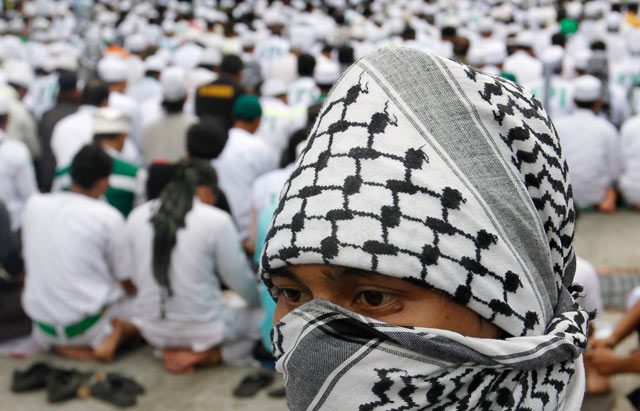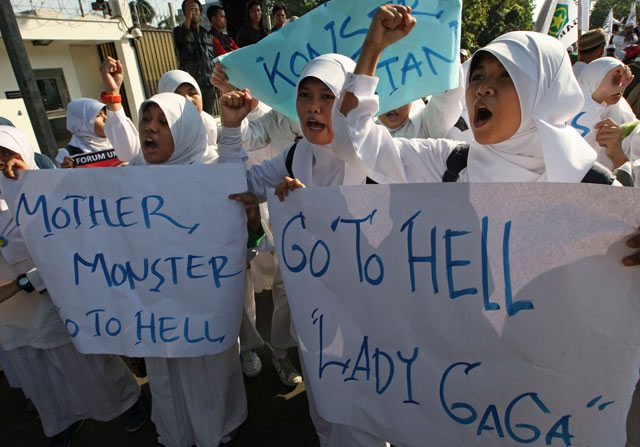Attacks by extremist Muslim groups have led the government to approve a bill that harks back to Indonesia’s dictatorial past, but it is NGOs that might bear the brunt of its power
By Sacha Passi and Dene Mullen
Clad in their trademark all-white attire, thousands of members of the Islamic Defenders Front (FPI) took to the streets of Jakarta in late August to mark the group’s 15th anniversary. The hardline faction, which started out as something approaching a violent neighbourhood watch, has since morphed into a 15-million-strong “pressure group” with the stated aim of ridding Indonesia of sin.

Photo by Reuters
Held up by US President Barack Obama as the model of a moderate Islamic nation, Indonesia remains in transition. Since the strict control of former President Suharto was relinquished in 1998, the country has moved rapidly. Economic growth has spawned a growing middle class, modernity has begun to take hold and transparency is slowly creeping into the political arena.
During these formative years, international aid and donor funding was viewed as an integral part of the development process, with the non-governmental sector deemed a national and international priority. However, while the country embraced its newfound freedoms and democratic values, a new trend began to emerge in the world’s most populous Muslim-majority nation: increasing threats and acts of violence from the FPI and other hardline Islamic movements. In the past, the FPI has lobbied successfully to have the editor of Indonesia’s heavily toned down version of Playboy imprisoned and has raided Asia’s largest gay film festival in Jakarta. Hooded mobs have regularly targeted nightclubs, churches and liberal Muslims.
A deadly raid took place in July of this year against an establishment in central Java that the FPI alleged to be a brothel, which was operating during Ramadan.
Between 2009 and 2010, documented acts of religious intolerance, particularly against ‘heterodox’ Islamic and Christian groups, increased by 30% in Indonesia. With the government seemingly unable to control violent Islamists, by September 2010 it had announced plans to approve a bill that would amend the law on social organisations that was first adopted under Suharto in 1985. The government argued that such reforms were necessary to curb the actions and influence of vigilante groups such as the FPI and the Betawi Brotherhood Forum, with the latter linked to Jakarta’s underworld and entrenched in extremist Islamic views.
“Indeed, the law stipulates sanctions against groups that engage in violence or that vilify societal groups,” said Michael Buehler, an associate professor of political science at Northen Illinois University. “However, most of the rules and regulations in the law are against registered non-governmental organisations (NGOs), especially foreign NGOs, and the FPI and Betawi Brotherhood are not registered.”
After lengthy delays and intense debate, the House of Representatives enacted the Mass Organisations Bill in July, handing the government greater control over public activities, including the power to disband organisations deemed a threat to the state. A “social organisation”, or NGO, is defined by the law as “an organisation founded voluntarily by citizens of the Republic of Indonesia on the basis of common activities, profession, function, religion and belief in God Almighty, so as to actively participate in the development of goals within the framework of Indonesia”. Under the new law, foreign nationals who want to start an NGO must have at least five years of legal residency in Indonesia and must deposit $1 million of their personal wealth in the organisation.

The bill not only imposes a variety of vague obligations and prohibitions on NGO activities, including severe limitations on the creation of foreign-funded organisations, it also forces organisations to respect Pancasila, a state philosophy about the belief in one god, regardless of their religious or secular orientation.
Political observers and international human rights groups have expressed deep concern that the new law will place unnecessary and onerous restrictions on the activities of NGOs, while at the same time fail to curb religious dissent as proposed.
“There was deliberate public framing of the current round of revisions as providing a necessary mechanism to deal with the criminal and unruly activity of widely disliked groups. Hope that the laws would be used to shut down these kinds of organisations perhaps explains the degree of support in certain segments of parliament, as well as the rejection of the laws by other segments that have well-known networks of mass organisations,” said Ian Wilson, lecturer at the School of Management and Governance with the Sir Walter Murdoch School of Public Policy and International Affairs, Australia. “The reality, however, is that the relationships between the FPI and other similar militant and vigilante groups with elites within political parties, the police and the military, make it highly unlikely that the laws will be mobilised against them.”
The throwback to repressive Suharto-era controls, such as subjecting civil society groups to unpredictable government power, is causing concern among critics. Political observers say vague regulations infringe upon rights to freedom of association, expression and religion, in addition to providing the government wide latitude to obstruct NGO work.
“The public sphere in Indonesia has narrowed for several years now, and this law is just the latest development,” said Buehler. “The law, as with most laws in Indonesia, is formulated in a very vague manner, which also increases the risk of abuse for political ends.”
The nature of the new law, such as the requirement that all NGOs must apply through the Ministry of Home Affairs for official approval to operate – despite the law not providing details about the application process, timelines for official approval, or penalties for noncompliance – enables government officials to interpret it arbitrarily, according to Andreas Harsono, Indonesia researcher for Human Rights Watch.
“The Ministry of Home Affairs is known to be an unfriendly state agency in terms of human rights,” he said. “It’s pretty hostile to environmental groups. It’s pretty hostile to anti-corruption watchdogs. Ironically, it tolerates violent organisations such as the FPI, which often organises attacks against minorities. It’s a huge concern that the ministry will have this new law at their disposal.”
Despite Indonesia’s emergence from dictatorial rule and its development of a promising economy and relatively stable political climate, the amendment of a law in order to heighten bureaucratic restrictions suggests that civil society freedoms remain tentative at best. Even if, as promised, the law is used to break up hardline Islamic organisations, this could lead to difficulties for NGOs that are trying to have it repealed – any use of it to disband the FPI, for example, could be seen as legitimisation of the bill.
What remains more likely than a crackdown on vigilante groups is that the amended law will be used by the government to take action against organisations considered a threat to the interests of people in high-ranking government roles, according to Wilson.
“Environmental groups, for example, are deeply concerned about implications for their activities,” he said, “particularly in the wake of the highly hostile response to Greenpeace’s anti-palm oil campaigns, which, incidentally, saw groups such as the FPI mobilising against them, most likely at the behest of vested interest.”
Also view:
“Shaking up the party” – Many Indonesians are hoping that Joko Widodo will spearhead a new era of clean politics once the current president wraps up his maximum second term in office
“Hunting for harmony” – Despite a signed agreement that paves the way for peace in Thailand, a ceasefire could be a long way off
“The number of the beast” – The anti-Muslim 969 movement is fuelling the fire of religious discontent in Myanmar

